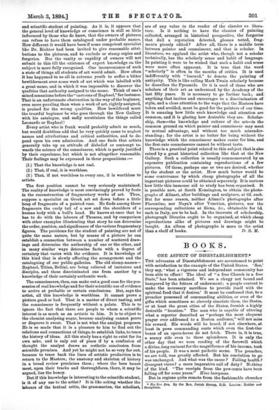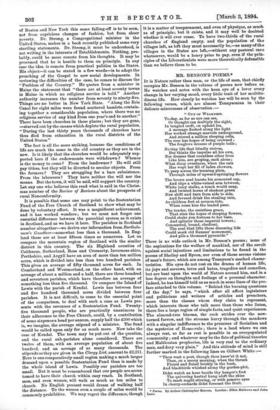BOOKS.
ONE ASPECT OF DISESTABLISHMENT.*
Tux advocates of Disestablishment are accustomed to point with satisfaction to the example of the United States. See,' they say, what a vigorous and independent community has been able to effect! The ideal of "a free Church in a free State," has been attained. We see a clergy not bound and hampered by the fetters of endowment; a people content to make the necessary sacrifices to provide itself with the spiritual food that it desires.' It must be confessed that, to a preacher possessed of commanding abilities, or even of the gifts which sometimes so cleverly simulate them, the States, or at least the great cities of the States, furnish a highly desirable "location." The man who is capable of uttering what a reporter described as "perhaps the most eloquent prayer ever addressed to a Boston audience," will not miss his reward. His words will be heard, if not elsewhere, at least in pews commanding rents which even the first-tier boxes of an opera-house do not fetch. There is, it is true, a seamy side even to these splendours. It is only the other day that we were reading of the farewell which a divine, long eminent for the magnificence of his income, took of his people. It was a most pathetic scene. The preacher, we are told, was greatly affected. But his resolution to go was unchanged. And what was the cause ? Failing health ? divergent views ? a more imperative call of duty ? Nothing of the kind. "The receipts from the pew-rents have been falling off for some years." Hine lacrymae.
But in regions quite remote from the fashionable churches
•
The New Era. BY the Rev* Josiah Strong, H.D. London: Hodder and Stoughton,
of Boston and New York this same falling-off is to be seen, not from capricious changes of fashion, but from sheer poverty. Dr. Strong, a Congregational minister in the United States, makes in a book recently published some very startling statements. Dr. Strong, it must be understood, is not writing in the interests of Establishments. Nothing, pro- bably, could be more remote from his thoughts. It may be presumed that he is hostile to them on principle. In any case the idea is remote from practical politics in the States. His object—it can be stated in a few words—is to adapt the preaching of the Gospel to new social developments. In reviewing the difficulties of the case, he comes to discuss the "Problem of the Country." He quotes from a minister in Maine the statement that "there are at least seventy towns in Maine in which no religious service is held." Another authority increases the number from seventy to ninety-five. Things are no better in New York State. "Along the Erie Canal for eight miles were found scattered hamlets, contain- ing together a considerable population, where there was no religions service of any kind from one year's end to another." There have been churches in these places ; but they are gone, —starved out by the causes which deplete the rural population. "During the last thirty years thousands of churches have thus died from exhaustion in the rural districts of the United States."
The fact is all the more striking, because the conditions of life are much the same in the old country as they are in the new. Is it likely that the churches would be adequately sup- ported here if the endowments were withdrawn ? Whence is the money to come ? From the landowner ? He will still pay tithes, but they will be diverted to secular objects. From the farmers ? They are struggling for a bare subsistence. From the labourers ? They have neither the will nor the means. But the town, it will be said, will support the country. Let any one who believes this read what is said in the Christ- mas number of the Review of Reviews about the prospects of rural Nonconformity.
It is possible that some one may point to the Sustentation Fund of the Free Church of Scotland to show what may be done by voluntary effort. It was a magnificent achievement, and it has worked wonders ; but we must not forget one essential difference between the parochial system as it exists in Scotland, and as we have it here. The parishes in Scotland number altogether—we derive our information from Bartholo- mew's Gazetteer—somewhat less than a thousand. In Eng- land these are at least fifteen times as numerous. Let us compare the mountain region of Scotland with the similar district in this country. The six Highland counties of Caithness, Sutherland, Ross and Cromarty, Inverness-shire, Perthshire, and Argyll have an area of more than ten million acres, which is divided into less than two hundred parishes. This gives an average of fifty thousand acres for each. In Cumberland and Westmorland, on the other hand, with an acreage of about a million and a half, there are three hundred and seventeen parishes, which have therefore an average of something less than five thousand. Or compare the Island of Lewis with the parish of Kendal. Lewis has between four and five hundred thousand acres divided between four parishes. It is not difficult, to come to the essential point of the comparison, to deal with such a case as Lewis pre- sents with the revenues of a Sustentation Fund. Twenty- five thousand people, who are practically unanimous in their adherence to the Free Church, could, by a contribution of some sixpence a head per annum, supply half the 2300 which is, we imagine, the average stipend of a minister. The fund would be called upon only for as much more. Now take the case of Kendal. The town may be put out of the question, and the rural sub-parishes alone considered. There are twelve of them, with an average population of about five hundred, and an acreage of as many thousands. The stipends as they are given in the Clergy List, amount to 22,211. Here is one comparatively small region making a much larger demand upon a possible Sustentation Fund than is made by the whole island of Lewis. Possibly our parishes are too small. But it must be remembered that our people are accus- tomed to have their church within easy reach. In Scotland, men, and even women, will walk as much as ten miles to church. No English peasant would dream of walking half the distance. To the women even a couple of miles would be commonly prohibitive. We may regret the difference, though
it is a matter of temperament, and even of physique, as much as of principle; but it exists, and it may well be doubted whether it will ever cease. To have two-thirds of the rural churches of England empty, and the population of the villages left, as left they must necessarily be,—as many of the villages in the States are left,—without any pastoral care whatsoever, would be a heavy price to pay, even if the prin- ciples of the Liberationists were more theoretically defensible than we believe them to be.







































 Previous page
Previous page